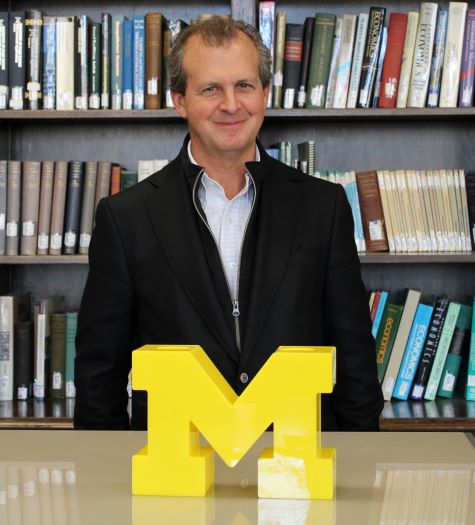Between Two Firms is an interview series accompanying Economics@Work. We ask alumni speakers the candid questions students can’t ask in person. This week’s guest is Drew Marcus, Senior Advisor at Guggenheim Securities, Managing Partner of Sugarloaf Rock Capital, LLC, and Venture Partner at Walden Venture Capital. Drew discusses the benefits of making personal contact when in the job search process.
Q: How did you land your first job out of college?
A: I had interned at Paine Webber in equity research over the summer while in college. I really liked equity research, thus I targeted my job search at research. I found the name of the director of research at every firm; I sent them a letter. This was before email. I had taken a lot of international economics classes at Michigan and also did a lot of Middle Eastern polisci studying, so I really thought I wanted to do something that was international. I really thought I wanted to be an oil analyst, so I targeted all the oil analysts. And I also liked technology, so I targeted technology analysts. So I sent out letters to the directors of research, the oil analysts, and the technology analysts. The funny story was, I ended up getting an interview and got the job at Kidder, Peabody, which back then was a firm famous for its research. The day after I got my job offer, I got a letter in the mail saying that they reviewed the resume but there were no opportunities available. So one of them ended up at human resources, which rejected me, but one of the other letters somehow stuck.
Q: You mentioned you studied a lot of international economics. Do you still apply any concepts from these courses that you learned in college?
A: My career has been focused on investing and advising in the media sector, which is largely a domestic business, not an international business. Media is largely a supply-and-demand business, but I think also the understanding of secular forces versus cyclical forces, and how to weight them in your decision-making, that’s something that is right out of economic theory.
Q: You mentioned you work a significant amount of time each day. How do you strive for a work-life balance in your own life?
A: Number one, I generally view that sleep is overrated. As a philosophy, if I don’t get a good night’s sleep, I don’t dwell on it, I just move forward. Like last night, I slept very little so I could catch the 5:50 plane to get out here this morning. I catch up on sleep when I can. Don’t make it worse by complaining about it or whining about it. But generally the life-work balance for a workaholic is brutally difficult. I’m probably successful because my wife is tolerant, not because I’m doing anything right. My wife is someone who I met while she was working on Wall Street, so I think she understood that she was marrying a workaholic. She has low expectations, which is good for me.
Q: Has not having an MBA ever hindered you?
A: I’ve been lucky that it hasn’t, because for the first 20 years of my career I stayed within the same vertical, and I think the MBA gives you horizontal flexibility. However, there was a point where I was debating going into banking, and the banking offers were much more junior than where I was in research, and I think part of that was due to not having an MBA. But, fortunately once you kind of hit that “Managing director” part of your career then it doesn’t matter whether you have a graduate degree or not. Also, I would mention that I did get my CFA, which I think is very well-regarded and supplements a lot of what you would miss in an MBA.
Q: Because much of economics is not finance, how did you educate yourself beyond what Michigan gave you?
A: A lot of that was on-the-job training. I did a summer internship my rising freshman year, rising sophomore year, rising junior year, and rising senior year. I took advantage of Michigan having very long summers, so there was a lot of on-the-job training through summer internships.
Q: What are some areas where you have to work harder than BBAs or MBAs as an Econ major?
A: I think you have to backfill some of the skills. You have the Excel skills, understand how to do a discounted cash flow model, have the accounting skills and understand stats.
Q: In an industry like venture capital, what advice would you give to really risk-averse individuals who want to enter the industry?
A: I think it’s really important to match your career choice with your aptitudes and interests. If you’re a super risk-intolerant individual then venture capital is probably the wrong place to be.
Q: What was your favorite experience at Michigan?
A: Beating Ohio State. I know that hasn’t happened in a while, but it did happen during my four years. Otherwise, I think Michigan teaches you to be self-motivated and self-disciplined, and I think that’s where the Michigan graduates stand out when they hit the workforce.


